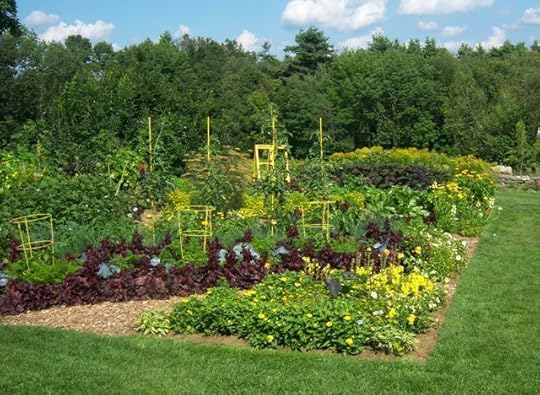Fertilize with Bird Song?
Sometimes I wake in the morning and it's still dark. I can't tell which cat is curled against my ribs, nor see the outline of the windows yet, and except for the engine of a truck whose headlights angle through the room as it speeds past my mailbox, there's total silence. The calm, as they say, before the storm.
If I don't fall back to sleep, I like to lie there and wait for my favorite band to start playing. Sweeter than the Grateful Dead, more raucous than the Gipsy Kings, and even older than the Rolling Stones, the dawn chorus of song birds begins before I can see any light at all, and lasts until every blossom on every branch is clearly visible. It's a wonderful melee, a beautiful cacophony, both melodic and chaotic, a crazy din. It reminds me of the way Utah Phillips sometimes ended his concerts. He'd announce it was time to sing the People's National Anthem, and before h is audience could get ready to protest, he'd have everyone standing up singing their own favorite song at the top of their lungs, in unison. The noise went beyond horrible into some unexpected joyous place, and that's where the bird chorus goes, too.
is audience could get ready to protest, he'd have everyone standing up singing their own favorite song at the top of their lungs, in unison. The noise went beyond horrible into some unexpected joyous place, and that's where the bird chorus goes, too.
The average bird has a wide range and repertoire. No one quite knows why dawn is the designated hour for birdsong bliss, although they think singing has to do with claiming territory and attracting mates. Sound carries almost twenty times farther at dawn than at midday, so it's an effective broadcasting hour, and because it isn't light yet, birds can't start foraging, so there isn't that distraction.
Yesterday I heard a marvelous thing I'm still trying to find out more about. Supposedly, when birdsong begins at dawn, the small cells on the undersides of plant leaves, called stomata, open in response to the sound. Plants absorb nutrients through their leaves this way, so the more open the stomata, the more food they'll take in, and the larger they'll grow. If you cut down bird habitat around a garden or farm, thereby reducing the bird population, your plants won't grow as large, lush, and productively as they otherwise would.
Some curious human being, of course, worked out a replication of bird song to see what happens if you play MORE sounds and convince the stomata to stay open longer. Using a cassette that included Vivaldi's Spring movement from The Four Seasons, Indian ragas, and Bach's E-major concerto for violin, this guy claims to increase growth by 500 - 700% this way. Ottawa University researchers broadcast Bach's violin concertos to a wheat field during one experiment, and reportedly increased the size of the wheat grains by 66%.
While I love the idea that birdsong influences plant health and productivity, the jury's still out here at my house. The grass is a little taller, and my peonies are huge this year, but the lavender looks sort of puny.
The cats, I'm happy to report, are the same size they've always been.



